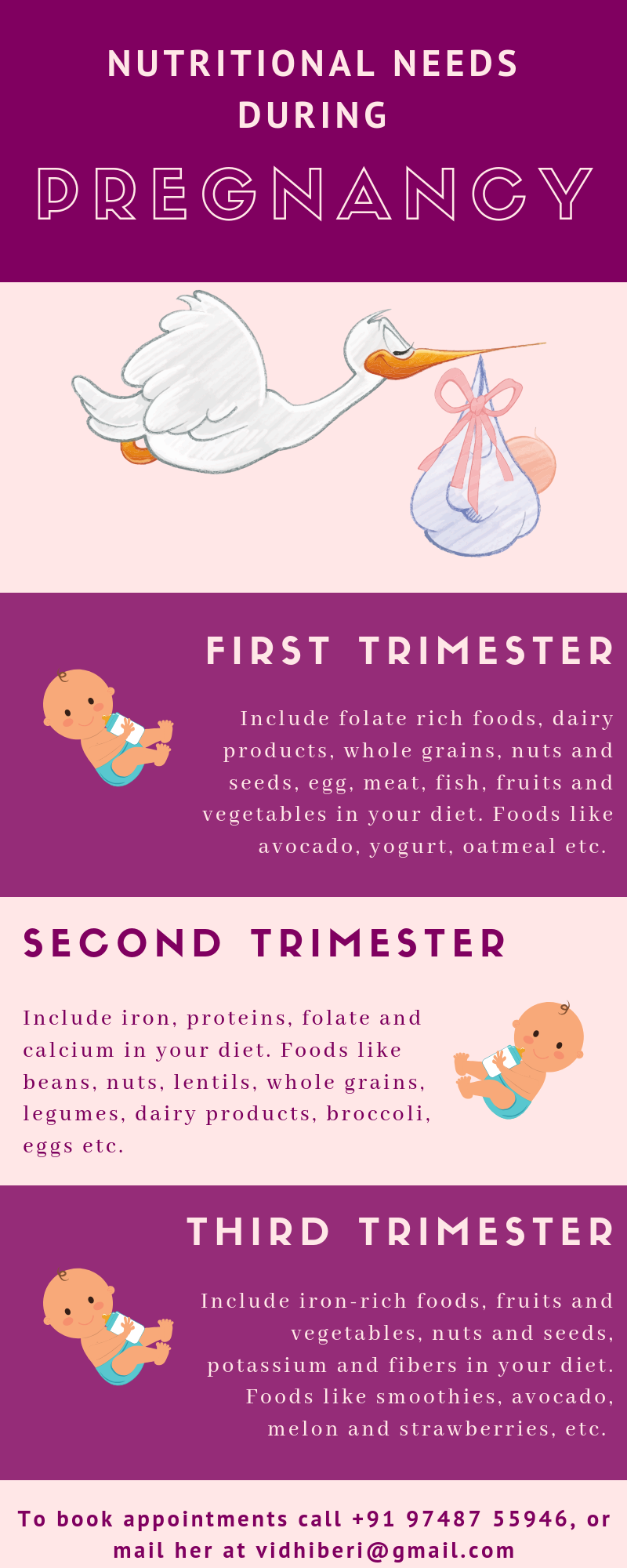Pregnancy is considered to be one of the most beautiful phases of a woman’s life. During this phase, however, a woman goes through remarkable and quite explicable changes in her body. This teamed up with morning sickness and a few more problems, calls for a good pregnancy plan to combat all the problems. Proper nutrition and healthy lifestyle is the ultimate key for a healthy pregnancy.
This is one of the reasons why adopting a healthy maternity wellness programme is important. Here, we present important health and nutrition information for pregnant women to cope up beautifully with during all the three trimesters.
 1st Trimester of Pregnancy
1st Trimester of PregnancyIn the span of the first trimester, your body undergoes many hormonal and physical changes such as extreme tiredness, tender and swollen breasts, certain food cravings, mood swings, constipation, headache, etc.
During the second trimester, a woman experiences several symptoms such as nausea and fatigue, abdominal expansion, darkening of the skin around your nipples, etc.
Protein
During this trimester of pregnancy, the intake of protein should be 75 to 100gms per day. That will help to grow the mother's breast and uterus; brains and other tissues of the baby. Beans, nuts, lentils, cooked fish, lean meats, egg, tempeh and tofu are the protein-rich essential food items for this trimester of pregnancy.
Iron
Sufficient iron intake will help to carry and balance the oxygen level within the body. During pregnancy, adequate intake of iron helps to maintain the uninterrupted flow of oxygen. That helps in the development of the baby during this trimester. Oatmeal, bread, whole grains, green vegetables, lentils, beans, breakfast cereals and nuts are the enriched sources of iron.
Folate
400 to 800 mcg of folic acid or folate are essential to intake during this phase. Fortified cereals, cabbage, spinach, legumes, oranges and whole grains are the common source of Folate.
Calcium
During this trimester of pregnancy, 1000 to 1300 mg of calcium need to take on a daily basis. This will help to develop the teeth and bones of the baby. This also helps in smooth functions of the circulatory system, nerves and muscles. Tofu, almond, white beans, broccoli, dairy products, sardines with bones and eggs are commonly known examples of calcium-rich food items.
Other than these essential nutrients, the pregnant women need to have chia seeds and flax seeds for omega 3 fatty acids; cheese and mushrooms for vitamin D. Pregnant women need to have more water and fluid than those who are not pregnant. Water helps to develop the amniotic sac and placenta. To avoid a reduction in breast milk production and defects of neural tubes, the pregnant lady needs to take lots of water during the 2nd trimester of pregnancy.
At this stage of pregnancy, the lady requires lots of energy to maintain their routine throughout the day. Additional intake of DHA and calcium are essential for the bones and brain growth of the fetus, during this phase. Vitamin D will improve the bone density of the fetus: intake of iron will help to increase the weight of the fetus; intake of adequate folic acid helps to develop the strong neural structure of the fetus; intake of sufficient vitamin helps in fetal growth and development of maternal tissues. The friendly foods for this trimester are stated below:
Vidhi Beri is CAPPA certified lactation and nutrition consultant in Kolkata that provides individualized maternity wellness programmes which include a highly personalized diet and fitness regime including counseling and necessary tips for a smooth pregnancy. A lot of women are now turning towards specialized programmes to get all the necessary help they can gather during this important phase. You can also book yourself an appointment. Just contact Vidhi Beri or visit her official website www.vidhiberi.com